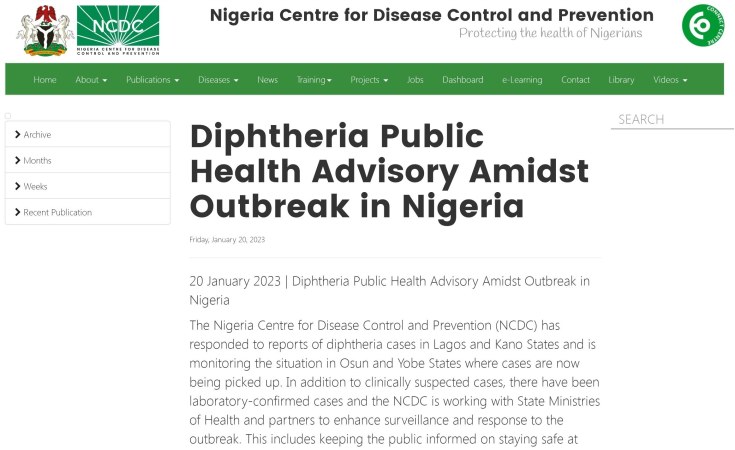Diphtheria, a serious bacterial infection caused by Corynebacterium species has been reported in about four states across the country.
As at January 20th, the Nigeria Centre for Disease Control (NCDC) said the bacteria, which affects the nose, throat and sometimes skin of an individual, has been reported in Kano, Lagos, Yobe and Osun States with 123 confirmed cases and 38 deaths in three of the states.
The director-general of NCDC, Dr. Adetifa Ifedayo, said given the sub-optimal coverage for the third dose of the diphtheria containing pentavalent vaccine (54% - 2021 MICS & NICS) in the country, more cases from more states are expected.
He, however, said that the NCDC was working with State Ministries of Health and partners to enhance surveillance and response to the outbreak.
On those at risk of contracting diphtheria, the DG said children and adults who have not received any, or a single dose of the pentavalent vaccine (a diphtheria toxoid-containing vaccine) are most at risk.
He also said that people who live in a crowded environment, areas with poor sanitation, healthcare workers and others who are exposed to suspected/confirmed cases of diphtheria were at risk.
On transmission and symptoms, the DG said diphtheria spreads easily between people through direct contact with infected people, droplets from coughing or sneezing, contact with contaminated clothing and objects.
"Symptoms include fever, runny nose, sore throat, cough, red eyes (conjunctivitis), neck swelling. In severe cases, a thick grey or white patch appears on the tonsils and/or at the back of the throat associated with difficulty breathing," he added.
Afedayo, therefore, urged parents to ensure that their children are fully vaccinated against diphtheria with three doses of the pentavalent vaccine as recommended in the childhood immunisation.
"The Nigeria childhood immunisation schedule recommends three doses of pentavalent vaccine (diphtheria toxoid-containing vaccine). This is recommended for children in the 6th-, 10th- and 14th -week of life," he explained.
He also advised that individuals with signs and symptoms suggestive of diphtheria, should isolate themselves and notify the appropriate authorities.
Also, a public health expert in Abuja, Dr. Timothy Obi, said it is possible that the outbreak is due to the disruption in immunisation, during the COVID-19 pandemic while cautioning that every fever should not be assumed to be malaria.
"A lot of people just have this habit of thinking that every fever is malaria and it is not good for us. When you are sick or your child is sick, don't just assume its malaria and start taking malaria drugs, you must go to the hospital. That sickness you call malaria may actually be diphtheria," he said.


